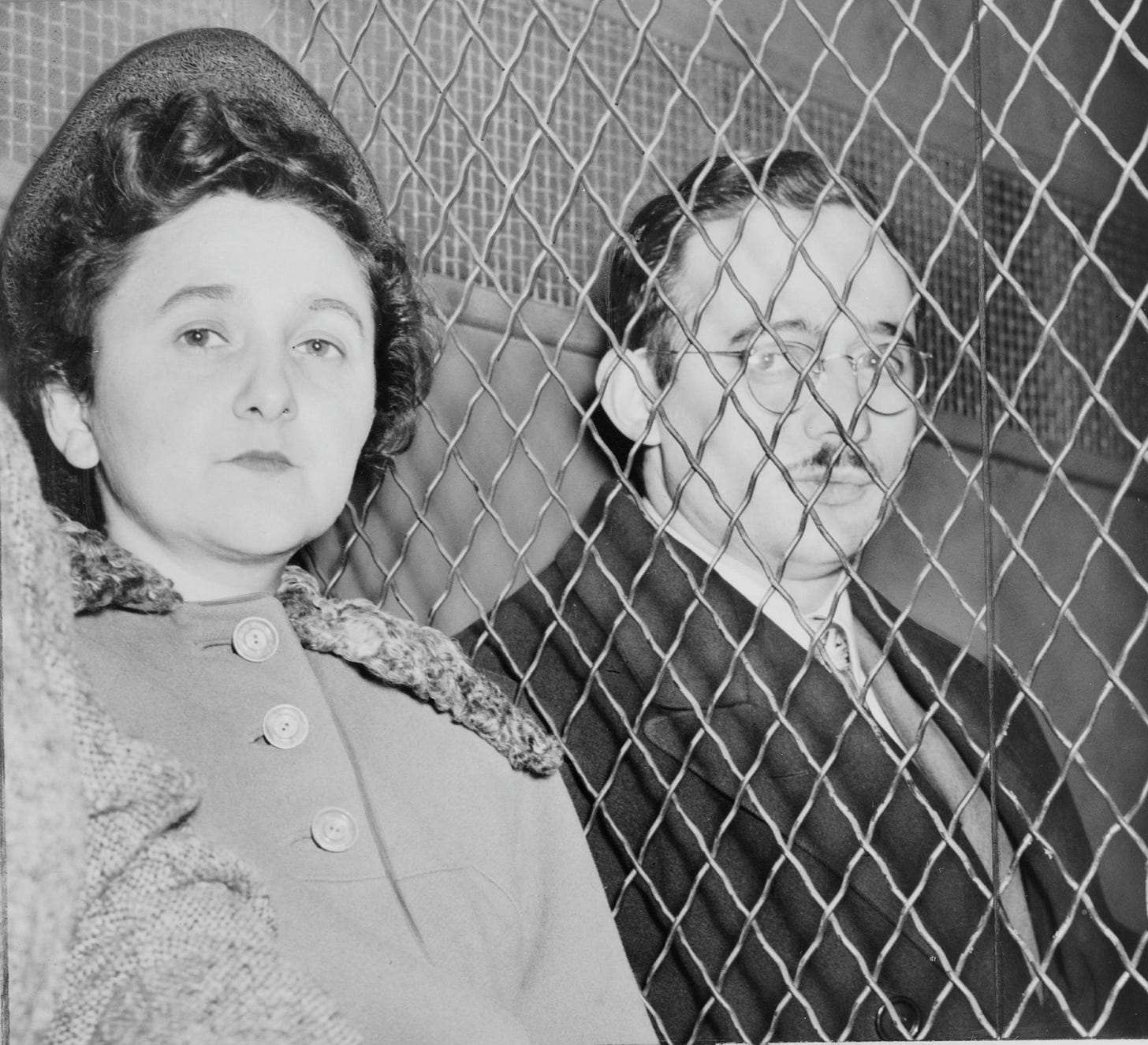This Day in Legal History: Supreme Court Denies Cert for Rosenbergs
On October 13, 1952, the United States Supreme Court declined to hear the appeal of Julius and Ethel Rosenberg, who had been convicted of conspiracy to commit espionage by passing atomic secrets to the Soviet Union. The couple had been sentenced to death in 1951 following a high-profile trial that captivated Cold War-era America. The Rosenbergs’ appeal was their final attempt to overturn the conviction and avoid execution. By denying certiorari, the Supreme Court allowed their death sentences to stand without offering an opinion on the merits of the case.
The decision intensified public debate over the fairness of their trial, with critics arguing that anti-communist hysteria had tainted the proceedings and supporters maintaining that the punishment fit the crime. Nearly a year later, on June 17, 1953, Justice William O. Douglas granted a temporary stay of execution after a new legal argument was raised involving the application of the Atomic Energy Act. However, the full Court reconvened in an emergency session and voted to vacate Douglas’s stay the next day.
The Rosenbergs were executed by electric chair at Sing Sing prison on June 19, 1953, marking the first and only time American civilians were executed for espionage during peacetime. Their case remains controversial, with questions still surrounding the extent of Ethel’s involvement and the fairness of the trial. Over time, declassified documents, including material from the Venona project, have confirmed Julius’s espionage activities but left lingering doubts about Ethel’s role and the proportionality of her sentence.
California enacted a new law (A.B. 931) that prohibits in-state lawyers and law firms from sharing contingency fees with out-of-state alternative business structures (ABS)—firms that are owned by non-lawyers. The bill, signed by Governor Gavin Newsom, directly impacts litigation funding operations and firms based in states like Arizona, which began allowing non-lawyer ownership in 2021. Originally broader in scope, the bill was narrowed to specifically ban contingent fee sharing, a common payment model in mass tort and personal injury cases.
The move is expected to disrupt partnerships between California lawyers and ABS firms in jurisdictions like Arizona, Utah, Washington, D.C., and Puerto Rico. Critics argue the law may harm both legal practitioners and consumers by limiting access to capital and cross-border collaboration. Amendments to the bill in August preserved certain flat fee and fixed fee arrangements, allowing some limited forms of financial collaboration to continue. KPMG, which recently launched a law firm in Arizona, declined to comment on whether the new restrictions would impact its plans to partner with attorneys nationwide.
California Bans Contingent Fee Sharing With ‘Alternative’ Firms
The U.S. Court of Appeals for the Seventh Circuit denied the Trump administration’s emergency request to deploy National Guard troops to Illinois, upholding a lower court’s temporary block on the mobilization. The deployment plan included troops from the Texas National Guard, aimed at supporting federal agents during recent protests in the Chicago area. However, the court allowed those already present in Illinois to remain, pending further legal developments.
U.S. District Judge April Perry had earlier questioned the administration’s claims that troops were necessary to protect federal personnel from violent unrest, citing a lack of clear justification. Her order blocking the deployment is set to last until at least October 23, with the possibility of extension. Similar legal challenges are unfolding elsewhere, including in Oregon, where another judge blocked troop deployments to Portland. That ruling, however, may be overturned by a different appellate court.
Democratic governors in affected states have argued that the administration exaggerated threats from largely peaceful protests to justify military action. A court in Los Angeles also ruled a previous deployment illegal, though that decision is on hold pending appeal. Under U.S. law, the National Guard typically operates under state control during domestic missions, making federal involvement a contentious legal issue.
Appeals court rejects Trump request to deploy National Guard in Chicago area | Reuters
Federal courts in New England—particularly in Massachusetts, Rhode Island, New Hampshire, and Maine—have emerged as strategic venues for legal challenges against President Donald Trump’s policies since his return to office in January 2025. A Reuters analysis found at least 72 lawsuits targeting Trump’s policies filed in these four states, with trial judges ruling against the administration in 46 out of 51 cases decided so far. These challenges include efforts to block the administration’s actions on deportations, federal education cuts, changes to birthright citizenship, and fast-tracked deportations to unstable third countries like South Sudan.
The region’s courts fall under the 1st U.S. Circuit Court of Appeals, which has all five of its active judges appointed by Democratic presidents. Litigants see these courts as favorable due to their composition—17 of 20 active trial judges in the region are also Democratic appointees. Judges like William Young in Boston and Allison Burroughs have issued high-profile rulings against Trump, with Young warning of threats to constitutional values and Burroughs urging courts to defend free speech. Judge John McConnell in Rhode Island has also issued significant decisions, such as blocking a sweeping federal funding freeze.
While the 1st Circuit has mostly upheld lower court rulings against Trump, the Supreme Court—dominated by a 6-3 conservative majority—has stepped in multiple times to stay or reverse those decisions. Still, the administration has not appealed every ruling, allowing some key decisions to remain in place, including those affecting mail-in ballot rules and funding for arts groups and Head Start programs. Democratic attorneys general are actively choosing New England courts for their reliability, with one noting that “you kind of know what you’re getting.”
New England courts become a battleground for challenges to Trump | Reuters













